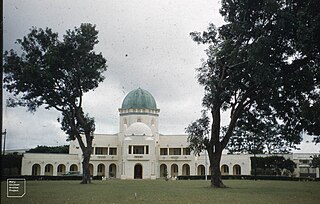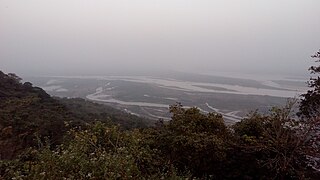
The Lugard Footbridge is a pedestrian bridge located in Kaduna, the capital of Kaduna State, Nigeria.

The Lugard Footbridge is a pedestrian bridge located in Kaduna, the capital of Kaduna State, Nigeria.
It was built by Sir Frederick Lugard in 1904 at Zungeru, the capital of the Northern Protectorate of Nigeria. [1] After the amalgamation of the Northern and Southern Protectorates, the bridge was reconstructed in 1920 after it was moved to Gamji Gate in Kaduna, which at the time served as the new Northern Headquarters. [2] On 16 February 1956, the National Commission for Museums and Monuments declared the footbridge a historic monument. [3]
Presently located in the General Hassan Katsina Park, Kaduna, the Lugard Footbridge is made up of iron with other complementing features including handrails and wire gauze while beams, two pillars, girders and concrete are for structural strength and balance. With its length and width at 14.2m and 1.75m respectively, the footbridge is made up of 42 wooden steps with its deck and pillar painted green and white. [3]
The history of Nigeria can be traced to the earliest inhabitants whose remains date from at least 13,000 BC through early civilizations such as the Nok culture which began around 1500 BC. Numerous ancient African civilizations settled in the region that is known today as Nigeria, such as the Kingdom of Nri, the Benin Empire, and the Oyo Empire. Islam reached Nigeria through the Bornu Empire between and Hausa Kingdom during the 11th century, while Christianity came to Nigeria in the 15th century through Augustinian and Capuchin monks from Portugal to the Kingdom of Warri. The Songhai Empire also occupied part of the region. From the 15th century, European slave traders arrived in the region to purchase enslaved Africans as part of the Atlantic slave trade, which started in the region of modern-day Nigeria; the first Nigerian port used by European slave traders was Badagry, a coastal harbour. Local merchants provided them with slaves, escalating conflicts among the ethnic groups in the region and disrupting older trade patterns through the Trans-Saharan route.

Frederick John Dealtry Lugard, 1st Baron Lugard, known as Sir Frederick Lugard between 1901 and 1928, was a British soldier, mercenary, explorer of Africa and a colonial administrator. He was Governor of Hong Kong (1907–1912), the last Governor of Southern Nigeria Protectorate (1912–1914), the first High Commissioner (1900–1906) and last Governor (1912–1914) of Northern Nigeria Protectorate and the first Governor-General of Nigeria (1914–1919).

Northern Nigeria was a British protectorate which lasted from 1900 until 1914 and covered the northern part of what is now Nigeria.
Ijebu is a kingdom in South West Nigeria. It was formed around the fifteenth century. According to legend, its ruling dynasty was founded by Obanta whose personal name was Ogborogan of Ile-Ife. Its contemporary successor is one of the country's traditional states.

Southern Nigeria was a British protectorate in the coastal areas of modern-day Nigeria formed in 1900 from the union of the Niger Coast Protectorate with territories chartered by the Royal Niger Company below Lokoja on the Niger River.

Kaduna is the capital city of Kaduna State, and the former political capital of Northern Nigeria. It is located in north-western Nigeria, on the Kaduna River. It is a trade center and a major transportation hub as the gateway to northern states of Nigeria, with its rail and important road network.

Kaduna State is a state in the northwest geopolitical zone of Nigeria. The state capital is its namesake, the city of Kaduna which happened to be the 8th largest city in the country as at 2006. Created in 1967 as North-Central State, which also encompassed the modern Katsina State, Kaduna State achieved its current borders in 1987. Kaduna State is the fourth largest and third most populous state in the country, Kaduna State is nicknamed the Centre of Learning, owing to the presence of numerous educational institutions of importance within the state such as Ahmadu Bello University.

Northern Nigeria was an autonomous division within Nigeria, distinctly different from the southern part of the country, with independent customs, foreign relations and security structures. In 1962, it acquired the territory of the British Northern Cameroons, which voted to become a province within Northern Nigeria.
Lugard may refer to:

Zaria is a metropolitan city in Nigeria which lies within four local government areas in Kaduna State; it is the capital city to the Zazzau Emirate Council, and one of the original seven Hausa city-states and a major city in the state. The local government areas that made up of the city of Zaria includes: Zaria Local Government, Sabon Gari Local Government, Giwa Local Government and Soba Local Government areas in Kaduna state, Nigeria.
The Bussa rebellion, also known as the Boussa rebellion, was a small insurrection in the town of Bussa against the policy of indirect rule in British-ruled Nigeria in June 1915. The rebellion was triggered by the British deposition of the local Emir of Bussa, Kitoro Gani, and his replacement with a Native Administration. The rebels attacked and killed around half of the members of the Administration, while the rest fled, leaving the rebels in control in Bussa. Despite the ongoing Kamerun campaign against the German Empire, the British were able to use a small force of soldiers which quickly suppressed the rebellion incurring no casualties. The Bussa Rebellion was the subject of a major work by British historian Michael Crowder.

Colonial Nigeria was ruled by the British Empire from the mid-nineteenth century until 1960 when Nigeria achieved independence. The revolt and resistance of the enslaved Africans all over Europe and America led to the prohibition of slave trade in Nigeria. Britain annexed Lagos in 1861 and established the Oil River Protectorate in 1884. British influence in the Niger area increased gradually over the 19th century, but Britain did not effectively occupy the area until 1885. Other European powers acknowledged Britain's dominance over the area in the 1885 Berlin Conference.

Barewa College is a college in Zaria, Kaduna State, northern Nigeria. Founded in 1921 by British Governor General Hugh Clifford, it was originally known as Katsina College. It switched its name to Kaduna College in 1938 and to Government College, Zaria in 1949 before settling on Barewa College. It is one of the largest boarding schools in Northern Nigeria and was the most-celebrated post-primary schools there up to the early 1960s. The school is known for the large number of elites from the region who attended and counts among its alumni include Tafawa Balewa who was Prime Minister of Nigeria from 1960 to 1966, four heads of state of Nigeria. The school is located along Gaskiya road in the Tukur -Tukur area of Zaria.
Zungeru is a town in Niger State, Nigeria. It was the capital of the British protectorate of Northern Nigeria from 1902 until 1916. It is the site of the Niger State Polytechnic and is located on the Kaduna River.
Federalism in Nigeria refers to the devolution of self-governance by the West African nation of Nigeria to its federated states, who share sovereignty with the Federal Government.

Sir Herbert Richmond Palmer was an English barrister, who became a colonial supervisor for Britain during the inter-World War period. He served as a lieutenant governor in Nigeria, governor and Commander-in-Chief of The Gambia and governor and Commander-in-Chief of Cyprus.
The history of Northern Nigeria covers the history of the region form pre-historic times to the modern period of Northern Nigerian state.

The National Commission for Museums and Monuments (NCMM), also referred to as National Museum of Nigeria was Founded in 1979 by the Federal Government of Nigeria with decree 77 of 1979 to be in charge of the collection, documentation, conservation and presentation of the National Cultural properties to the public for the purposes of Education, Enlightenment and Entertainment. This decree recognized the National Commission for Museums and Monuments as a replacement for both the Federal Department of Antiquities of Nigeria and the Antiquities Commission. The decree has since been substituted in 1990 for the NCMM ACT, CAP 242 of the law of Federal Republic of Nigeria 1990.
The Kaduna State House of Assembly popularly known as Lugard Hall, it houses the Lugard Memorial Council Chamber and The Kaduna State House of Assembly, which is a branch of the Government of Kaduna State, it formerly served as the legislative house of the defunct Northern Nigeria (1954-1967) and the British Colonial government of Nigeria (1914-1954) where all legislative decisions and laws for the governance of the region emanated. [[Kaduna State House of Assembly]] Named after the then Governor General of Nigeria Sir Frederick Lugard. It is a unicameral body with 34 members elected into the 34 state constituencies. The Kaduna state House of Assembly in the forth republic on 3 June 1999 which led to the formation of the first assembly whole life span democratically ended on 3 June 2003. The second assembly commenced on 6 June 2003 after the national election. The legislature been the second tier of Government in democratic dispensation is traditionally and constitutionally bestowed the responsibility of making laws. The Kaduna state House of Assembly is made up of the honorable speaker, his deputy and the representative of various state constituencies on a single vote basis. These legislators represent the 23 local government council in the state. The current Speaker of the State Assembly is Rt. Hon Yusuf Liman Dahiru from Kaduna South local government constituency of Kaduna State. Hon Yusuf Dahiru Liman of Makera constituency has emerged the speaker of 10th Kaduna State House of Assembly.

The Mount Patti Hill is a 1503 foot-tall mountain and tourist attraction in Lokoja, Nigeria. It is famous for being the place where British journalist and writer Flora Louise Shaw gave Nigeria its name.
10°30′19″N7°27′13″E / 10.50525°N 7.45351°E